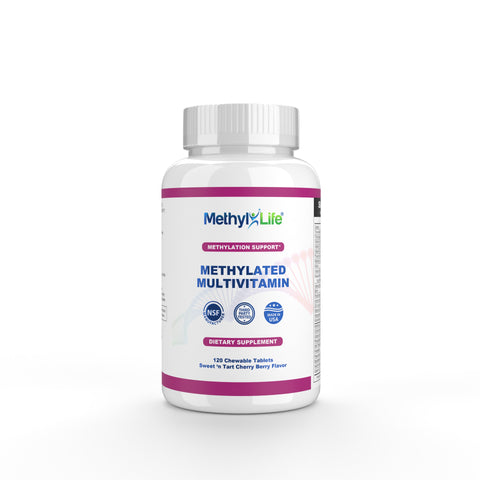
Vitamin Supplements for Children - Do they need them?
Product Recommendations
Methylated Multivitamin
$42.00
- Methylfolate, Active B12, Energy-Supporting Nutrients
- Cognition-Aiding, Methylation-Promoting Ingredients
- 3rd-Party Tested for Purity, Potency & Safety
- Methylated Multivitamin Pack Upgrade Option

Written By:
Katie Stone - Naturopath
Medical Reviewer:
Dr. Nare Simonyan - PhD Pharmaceutical Science
Edited By:
Kari Asadorian - BSN, RNUpdated On:
March 24, 2025Who needs vitamin and mineral supplements?
Vitamin supplementation is recommended for any condition which can cause or lead to a nutritional deficiency. Deficiencies may occur due to inadequate intake of the right foods, such as in the case of restrictive diets, inadequate absorption, and/or reduced availability of certain foods.
There can also be significant differences in micronutrients or vitamin deficits between low-income and high-income countries. However, even in countries where most foods are readily available, some children may not be able to obtain an adequate intake of certain essential nutrients, such as vitamins D and vitamin E and iodine.3
One study revealed that 41% of children using supplements wanted to “improve overall health,” while 37% wanted to “maintain optimal health.” Only 14% used supplements to “boost immunity”.4
Does my child need a vitamin or mineral supplement?
According to the American Academy of Pediatrics (AAP), most children who eat a healthy diet do not need a daily multivitamin. The right foods are usually enough to provide a balanced intake of nutrients.
However, low intakes of Vitamin D among children have led to the AAP (American Academy of Pediatrics) recommending that babies younger than 12 months old receive 400 IU of vitamin D each day, and children aged 12 months and upwards get 600 IU.5 The best vitamin D supplements are those that provide these quantities without added fillers.
Iron supplementation is also recommended as it is the most common deficiency among young children in developed nations. The recommended dietary intake for infants aged from 7 to 12 months is 11 mg/day, and from 1 through 3 years of age is 7 mg/day.6
Studies on children's language development and folic acid have also indicated the importance of folate for young children.
While some multivitamins can have benefits, they may not be safe or necessary for every child.
Nutrients that have not been tested or approved by the Food and Drug Administration (FDA) may not be safe for younger age groups. Some studies have revealed that some supplements contain potentially harmful chemicals and/or ingredients not mentioned on the label or inaccurate quantities of certain ingredients.7
Excessive intake of certain vitamins and nutrients can also occur if a child is eating a healthy diet (including vegan diets) and taking supplements. High doses of iron or vitamin A supplements for children8 may be toxic, while some nutrients may inhibit the absorption of others.
An estimated 23,000 emergency department visits in the United States every year are attributed to adverse events related to dietary supplements.9
How can kids get enough vitamins and minerals from their diet?
The best way to ensure that your child is getting adequate vitamins and minerals is by providing them with a balanced diet. This should comprise a wide variety of foods from the five food groups: wholegrains, fruits and vegetables, dairy (if tolerable) and lean proteins (meats, legumes, nuts). In most cases, these foods provide the right energy solutions without the need for supplementation.
What if my child does need a supplement?
Choosing the right supplement for a child requires some important research. These factors should be considered:
Supplement form
Children’s supplements are generally available as liquids, sprays, chewables, and gummies. Liquids and sprays are suitable for all ages and are easily administered. The best vitamin C supplement for kids aged over four years might be a chewable, provided it doesn’t contain potentially harmful fillers or binders.
Gummies, however, may not be suitable as they often resemble candy and may contain added sugars.
Dosage
Supplement dosages will vary according to the quantity of nutrients they contain. Always read the dosage instructions on the label and consult a health practitioner if you are unsure.
Ingredients
Some of the most important vitamins and minerals for a child's growth and development include vitamins A, C, D, E, and the vitamin B complex, plus calcium, iron, iodine, and zinc. [8] As mentioned, most of these can be sourced from whole foods and fresh fruits and vegetables. But if your child's diet is lacking in fresh folate foods and instead is eating high amounts of fortified foods (whether due to fussiness or restrictions) or absorption is impaired, a multivitamin that contains these essential nutrients may be necessary.
Well-known brands
The supplement industry is saturated with multivitamin products, but brands vary significantly in quality. Some of the best-selling brands on Amazon include SmartyPants, Methyl-Life®, Garden of Life, Enfamil, and Dr Mercola. SmartyPants is particularly well-rated by dieticians who say that it provides good quantities of vitamin B12, iodine, omega-3 fatty acids (DHA and EPA), and other nutrients important for cognitive development.
Choosing the right supplement for your kids
It's easy to get overwhelmed when searching for the best vitamin D3 supplement or the best vitamin D3 and K2 supplements for kids.
As with choosing any supplemental vitamins, be sure to read the label carefully. This is even more important when comparing children's supplements. Note the vitamins and minerals included and whether these are in their bioactive form. Bioactive nutrients require no further metabolism in the body, which means they are readily absorbed and utilized.
Check that the supplement has been approved by the FDA and is certified by the relevant authorities.
A children's multivitamin should also be free from any allergens, such as wheat, dairy, nuts, soy, and artificial additives. Other beneficial ingredients, such as antioxidants, are also a bonus.
Methyl-Life's® Chewable Methylated Multivitamin is an excellent example. As a low-dose formula in tablets, it is safe for children aged 4+ and provides a range of essential vitamins and minerals in their active form, including methylfolate (folate) and hydroxocobalamin (B12). This makes it one of the best vitamin B12 supplements for kids.
This unique formula is specially designed to optimize the methylation cycle and support energy, cognition, and immune function. It is also completely free from allergens and has been third-party tested and certified.
The takeaway
Children require a wide range of vitamins and minerals to ensure proper development and growth. While these nutrients should be provided by their diet, supplementation may be necessary if the diet is lacking in certain foods, or absorption is impaired.
A multivitamin such as Methyl-Life’s® Chewable Methylated Multi is both safe for children and ideal for supporting their growth and development. Taken daily, this multi can help to fill in any gaps in the diet and ensure kids are getting the nutrients they need.


Product Recommendations
Chewable Methylated Multivitamin - L-Methylfolate + Active B12 - MTHFR/Pregnancy/Children
$42.00
- Methylfolate, Active B12, Energy-Supporting Nutrients
- Cognition-Aiding, Methylation-Promoting Ingredients
- 3rd-Party Tested for Purity, Potency & Safety
- Methylated Multivitamin Pack Upgrade Option
References
-
Rachel Dawkins; "Do Kids Need Vitamin Supplements?"; John Hopkins Medicine; 2025
https://hopkinsallchildrens.org/ACH-News/General-News/Do-Kids-Need-Vitamin-Supplements
-
Bryan Stierman, Suruchi Mishra, Jaime J. Gahche, Nancy Potischman, Craig M. Hales; "Dietary Supplement Use in Children and Adolescents Aged ≤19 Years — United States, 2017–2018"; Morbidity and Mortality Weekly Report; 2020 Oct
https://www.cdc.gov/mmwr/volumes/69/wr/mm6943a1.htm
-
Boris Kaganov, Margherita Caroli, Artur Mazur, Atul Singhal, Andrea Vania; "Suboptimal Micronutrient Intake among Children in Europe"; Nutrients; 2015 May
https://pubmed.ncbi.nlm.nih.gov/25984741/
-
Regan L Bailey, Jaime J Gahche, Paul R Thomas, Johanna T Dwyer; "Why US children use dietary supplements"; Pediatric research; 2013 Oct
https://www.ncbi.nlm.nih.gov/pmc/articles/PMC3873849/
-
Centers for Disease Control and Prevention
https://www.cdc.gov/nutrition/infantandtoddlernutrition/vitamins-minerals/vitamin-d.html
-
Robert D. Baker, Frank R. Greer, The Committee on Nutrition; "Diagnosis and Prevention of Iron Deficiency and Iron-Deficiency Anemia in Infants and Young Children (0–3 Years of Age)"; The American Academy of Pediatrics, Vol. 126, Iss. 5; 2010 Nov
https://publications.aap.org/pediatrics/article/126/5/1040/65343/Diagnosis-and-Prevention-of-Iron-Deficiency-and?autologincheck=redirected
-
Jenna Tucker, Tessa Fischer, Laurence Upjohn, David Mazzera, Madhur Kumar; "Unapproved Pharmaceutical Ingredients Included in Dietary Supplements Associated With US Food and Drug Administration Warnings"; JAMA network open; 2018 Oct
https://www.ncbi.nlm.nih.gov/pmc/articles/PMC6324457
-
BMJ-British Medical Journal; "Vitamin A supplements for children could save 600,000 lives a year, experts predict."; ScienceDaily; 2011 Aug
https://sciencedaily.com/releases/2011/08/110825193059.htm
-
Andrew I Geller, Nadine Shehab, Nina J Weidle, Maribeth C Lovegrove, Beverly J Wolpert, Babgaleh B Timbo, Robert P Mozersky, Daniel S Budnitz; "Emergency Department Visits for Adverse Events Related to Dietary Supplements"; The New England journal of medicine; 2015 Oct
https://pubmed.ncbi.nlm.nih.gov/26465986/
-
Mohammad Yawar Yakoob, Clifford W. Lo; "Nutrition (Micronutrients) in Child Growth and Development: A Systematic Review on Current Evidence, Recommendations and Opportunities for Further Research"; Journal of Development & Behavioral Pediatrics; 2017 Oct
https://journals.lww.com/jrnldbp/Abstract/2017/10000/Nutrition__Micronutrients__in_Child_Growth_and.13.aspx

About the Author
Katie is a qualified Naturopath (BNatMed) and freelance writer from New Zealand. She specializes in all things health and wellness, particularly dietary supplements and nutrition. Katie is also a dedicated runner and has completed more half-marathons than she can count!
Related Articles

What is the Best Form of B12 for You?
Written By: Jamie Hope - Methyl-Life® Founder

Like what you read?
Please subscribe to get more content like this sent to your inbox.
Share This Article
Trusted by Experts. Backed by Science.
Trusted professionals crafting original content backed by verified research. Since 2012, Methyl-Life® has been dedicated to providing evidence-based education to help individuals better understand methylation and nutritional wellness.
-

Expert-authored education
Every article and guide is written or reviewed by professionals specializing in methylation science and nutritional biochemistry.
-

Research-verified information
Our content references peer-reviewed studies and verified data, ensuring accuracy, integrity, and real-world relevance.
-

Educational leadership since 2012
A founder-led team collaborating with clinicians, researchers, and health writers to make complex science accessible and actionable.
-

Transparent and trustworthy
All educational materials undergo internal review for scientific accuracy, compliance, and clarity before publication.
Blog Categories
Table of Contents
Product Recommendations
Chewable Methylated Multivitamin - L-Methylfolate + Active B12 - MTHFR/Pregnancy/Children
$42.00







